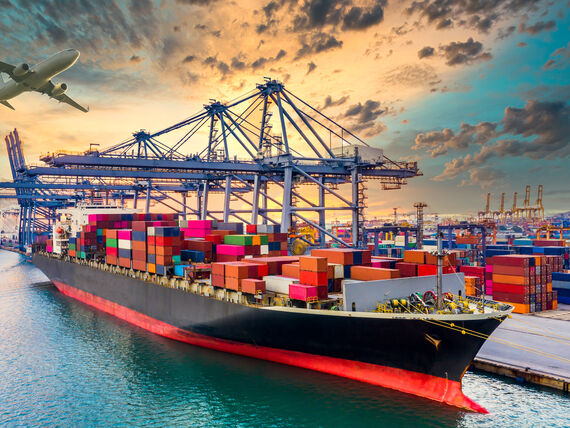Trendwatch: Labor deal at West Coast ports comes into view; Chinese exports cool in latest warning sign on global trade; Cool Chain Association identifies avoidable supply chain pain points in its second tracking trial of perishables

Labor deal at West Coast ports comes into view
Contract talks between unionized longshore workers and employers at West Coast ports appear to be headed into their final stretch following agreements on several major issues, potentially clearing the uncertainty that has been hanging over U.S. importers heading into their crucial fall selling season.
Some shipping officials familiar with the talks hope a tentative agreement could be reached by June, ending a contentious period in port labor relations that prompted some of the country’s biggest retailers and manufacturers to shift goods away from the region to avoid possible disruptions.
“The goal is to have smoothly operating supply chains and fluid ports, so the sooner [they] can get the negotiations wrapped up the better,” said Jessica Dankert, vice president for supply chain at the Retail Industry Leaders Association, which represents some of the nation’s biggest retailers.
Chinese exports cool in latest warning sign on global trade
SINGAPORE—Chinese export growth slowed in April as global trade cooled, underlining the importance of domestic spending as the main engine for the world’s second-largest economy after three years of strict Covid-19 controls.
The figures add to signs of softness in global trade as spending slows in the U.S. and Europe. Consumers and businesses are confronting steepening interest rates, persistent inflation and pockets of instability in the banking sector. Many economists expect recessions in advanced economies later this year.
Cool Chain Association identifies avoidable supply chain pain points in its second tracking trial of perishables
The Cool Chain Association (CCA)’s second tracking trial of perishables undertaken by its member the Perishable Products Export Control Board (PPECB) has identified significant areas where action can be taken to reduce food loss.
PPECB tracked consignments of raspberries, which have a very low shelf life, from South Africa to the UK as part of an ongoing project with the CCA to identify pain points in the cool supply chain in order to develop best handling practices for perishables.
Results announced at the CCA’s Annual General Meeting (AGM) today suggest that the cut-to-cool time, taken to bring the berries down to a temperature of around 5 ̊C, should be reduced to within 60 minutes of harvest to better maintain berry quality during storage.
Complaints against ocean carriers lead to over $1M in refunds
Over $1 million in disputed ocean shipping charges have now been waived or refunded by the Federal Maritime Commission as the agency ramps up enforcement of the Ocean Shipping Reform Act of 2022.
The FMC said last Wednesday that about $1.05 million has been returned to customers under the charge complaint process established upon the enactment of OSRA last summer. The agency has received 287 complaints in the 10 months since the law was signed, according to FMC Managing Director Lucille Marvin.
Customs brokers, forwarders & shippers ask Congress to change rail storage rules
More than seventy trade associations sent the House Transportation and Infrastructure Committee leadership a letter asking for clarification regarding rail storage fees charged as part of international ocean shipping: “Continuing to allow railroads to invoice importers and their agents directly without oversight undermines the purpose and intent of the Shipping Act.”
The May 2nd letter notes that there is a gap in authority between the Surface Transportation Board (STB) and the Federal Maritime Commission (FMC) to regulate these charges: “The lack of clear statutory authority for the FMC to address unreasonable rail storage charges assessed under ocean carrier through bills of lading is a gap that must be clarified.”
Global ‘Blue Deal’ urgently needed to protect and invest in our ocean
The ocean holds vast opportunities for developing countries to build more innovative and resilient economies.
But climate change, pollution, and overfishing threaten those opportunities and the livelihoods of about 3 billion people who rely on the ocean for food and income.
UNCTAD’s Trade and Environment Review 2023, published on 8 May, analyzes the world’s ocean economy – worth an estimated $3-6 trillion – and assesses how human activity and multiple global crises have significantly affected different sectors, including fishing, seafood, shipping, and coastal tourism.
TODAY IN ENERGY: What is OPEC+ and how is it different from OPEC?
The Organization of the Petroleum Exporting Countries, also known as OPEC, was formed in 1960 by Iraq, Iran, Kuwait, Saudi Arabia, and Venezuela. The organization has since expanded to 13 members. OPEC regularly meets to set oil production targets and coordinate output to help manage global oil prices for the entire group.
In 2016, largely in response to dramatically falling oil prices driven by significant increases in U.S. shale oil output, OPEC signed an agreement with 10 other oil-producing countries to create what is now known as OPEC+. Among these 10 countries was the world’s third-largest oil producer in 2022, Russia, which produced 13% of the world's total (10.3 million barrels per day [b/d]).


